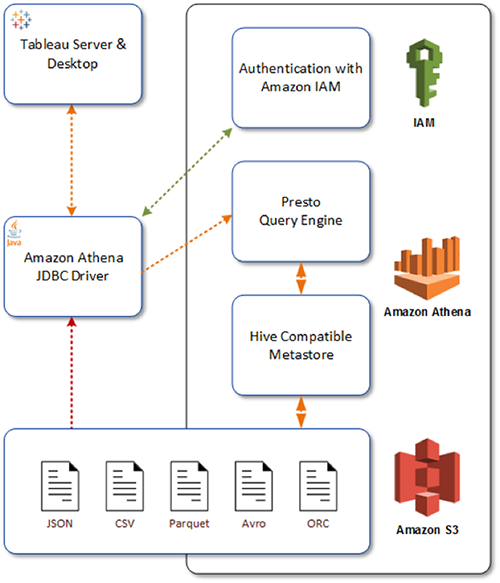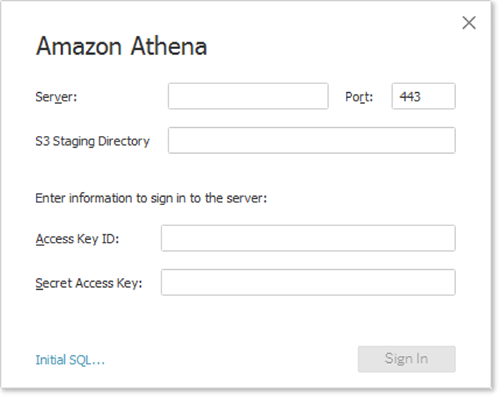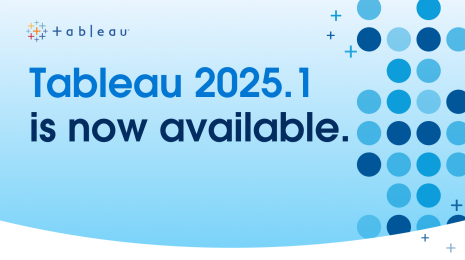Connect to your S3 data with the Amazon Athena connector in Tableau
Connect to your S3 data with the Amazon Athena connector in Tableau 10.3
Many Tableau customers have large buckets of data stored in Amazon Simple Storage Service (Amazon S3). In the past, making use of that data with Tableau has required a great deal of preparation. In November 2016, Amazon Web Services announced a new serverless interactive query service called Amazon Athena that lets you analyze your data stored in Amazon S3 using standard SQL queries. Since Amazon Athena’s launch, Tableau has worked to provide best-in-class support for this new service. The Tableau connector has been tested by many customers with very positive feedback—and we’re excited to announce that it will ship with Tableau Desktop, Server, and Online in version 10.3.
What does the Amazon Athena connector get me?
With the Amazon Athena connector, customers can quickly and directly connect Tableau to their Amazon S3 data for fast discovery and analysis, with drag-and-drop ease. In particular, we’re excited about the opportunities this presents for customers who have always wanted to learn and explore what’s in Amazon S3, so that they can make informed decisions on whether or not to provision it, and where (Hadoop, Impala, Amazon EMR, Amazon Redshift).

- Amazon Athena can make use of structured and semi-structured datasets based on common file types like CSV, JSON, and other columnar formats like Apache Parquet.
- Amazon Athena can access encrypted data on Amazon S3 and has support for the AWS Key Management Service (KMS).
- AWS provides a JDBC driver for connectivity.
- Underneath the covers, Amazon Athena uses Presto to provide standard SQL support with a variety of data formats.
- Amazon Athena’s data catalog is Hive Metastore-compatible, using Apache Hive DDL to define tables.
- Users can create and remove schemas without impacting the underlying data.
Get started with the Amazon Athena connector
Because Amazon Athena connects to Tableau via a JDBC driver, just remember to follow these steps to take full advantage of the feature:
- Install the latest version of 64-bit Java.
- Get the driver (download here).
- Place the driver:
- Windows: Save the Amazon Athena JDBC jar in the C:\Program Files\Tableau\Drivers location.
- Mac: Save the Amazon Athena JDBC jar in the ~/Library/Tableau/Drivers location.
- Restart Tableau.
Once these steps are completed, you can add a new Amazon Athena connection and begin configuring it.
There are a few interesting things to note about the connection dialog for Amazon Athena. The lack of an SSL checkbox is not an indicator for a lack of support. In fact, Amazon Athena uses SSL all the time, so be sure to specify port 443.

The remainder of the dialog is straight-forward. For the advanced users among us, here’s the nitty-gritty:
- Server: athena.region.amazon.com
for example, Athena.us-west-2.amazonaws.com - Port: 443
SSL by default - Amazon S3 Staging Directory: Find this setting in the AWS console for Amazon Athena.
AWS calls this property “Query Result Location” - Username/Password: Access Key ID and Secret Access Key
Access Key ID and Secret Access Key associated with the IAM user you are logging in as
As you start your adventure with Amazon Athena and Tableau, check out these articles to help you along the way:
Try Tableau 10.3
Features in Tableau 10.3 shine a light on productivity for analysts and business leaders alike. Smarter data access for the analyst brings new connectors, from PDF to Dropbox. Recommendations based on machine learning suggest relevant tables and joins. Plus, the Tableau Bridge gives Tableau Online users live access to on-premises data. Stay on top of the business with functionality meant for scale. Data-driven alerts keep your finger on the pulse of your analytics, and web authoring and accessibility improvements keep everyone asking and answering questions of their data.
We are working hard to get Tableau 10.3 out the door, but first we need your input! We want your feedback as early as possible to catch any issues and ensure great new features. Check out our beta program to learn more and sign up.
Visit Coming Soon to learn about all the features we're planning for Tableau 10.3. We’ll update the site throughout the beta period with more info and deep dive videos.
Learn more about Tableau 10.3
Related stories
Subscribe to our blog
Get the latest Tableau updates in your inbox.








